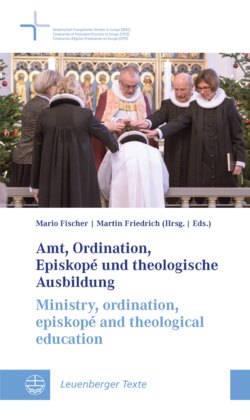Читать книгу Amt, Ordination, Episkopé und theologische Ausbildung / Ministry, ordination, episkopé and theological education - Группа авторов - Страница 30
На сайте Литреса книга снята с продажи.
2.3.2Terminology and practice of ordination
Оглавление65. In principle the churches agree that ordination is once for all and should not be repeated. However, there are different ways of practicing the ordination to lifelong service. Some churches which have a threefold ministry54 perform an act of ordination for each form of this ministry. As an alternative, this model need not divide the churches, provided it does not imply a gradation in the theological fullness of the ministry.
66. The question whether or not a person shall be ordained should not depend on their being full-time, or part time, or in an honorary capacity. Also it should not be determined solely on the basis of education. (This issue is of increasing importance as more and more churches introduce forms of local ministry.) The decisive factor for ordination is whether or not the service in question is a ministry of word and sacraments. If it is, the person to serve should be ordained, regardless of the time frame and geographical limitations that have been set for the particular service. The spiritual meaning of the means of grace and the reality of communicating God’s saving action in Christ is the same whether the ministry is exercised full time or part time, with or without a salary. The churches must not establish practices that could be perceived as a gradation in the ministry related to those elements that constitute the church. Arrangements for limited forms of service (ordained local ministries) can be both legitimate and helpful under given circumstances. However, the limiting factors should be established through the terms of employment and not through adaptations in the understanding of ordination.55 It is recognised that some churches have dispensations for the purpose of training or probation.
67. It is important that those who are to serve in ordained ministry should be sufficiently trained. Ordination of persons who do not have the necessary theological training runs the risk of not safeguarding faithfulness to the apostolic tradition, the unity of the church and the interconnectedness of word and sacrament. This does not mean, however, that ordination should be limited only to theologians who have undergone a full course of study. In any case, biblical and theological training and spiritual maturity are important also for limited forms of employment. If an ordained person serving, or having served, in a limited employment acquires full theological training, then he or she should be eligible for full time ministry without being reordained.
68. Since ordination is in principle conferred only once in a lifetime it should normally be a requirement that the ordinand be ready for a lifelong ministry, responding to the engaging vocation of God and the church, even if such a development is not arranged or envisaged at the time of ordination.56
69. The expressed commitment of the ordinand is an indispensable part of the ordination liturgy. It generally has the form of an affirmative response by the ordinand to questions raised by the presiding minister. The church, on the other hand, commits itself to support the ordained by its prayers and encouragement and to provide appropriate conditions for the exercise of the ministry. The presence and affirmation of the congregation at ordinations represent the corporate participation of the church in which the ordinand is to serve, and also the ecumenical perspective that the ministry of word and sacraments is instituted not for a local church only, but for the one holy catholic and apostolic church.57 Within the CPCE, this is expressed in the mutual recognition of ordination for the ministry of word and sacraments (LA 33, cf. above no. 57).
70. It is a broadly agreed practice among the churches, both in CPCE and in the worldwide oikoumene, that ordination shall be conducted by persons who are themselves ordained, usually with participation also of non-ordained persons.58 They exercise their task on behalf of the whole congregation which calls the ordinand into the service of the whole people of God. Since ordination also includes the recognition of ministers beyond the confines of the individual congregation and church, the ordinations are normally performed by persons entrusted with the ministry of episkopé. Ordinations commonly take place in the churches (e.g. cathedrals) where the ordaining ministers serve, or in the churches where those to be ordained shall work.59 In both cases the interrelation between the world-wide church and the local congregation, should be expressly stated.
